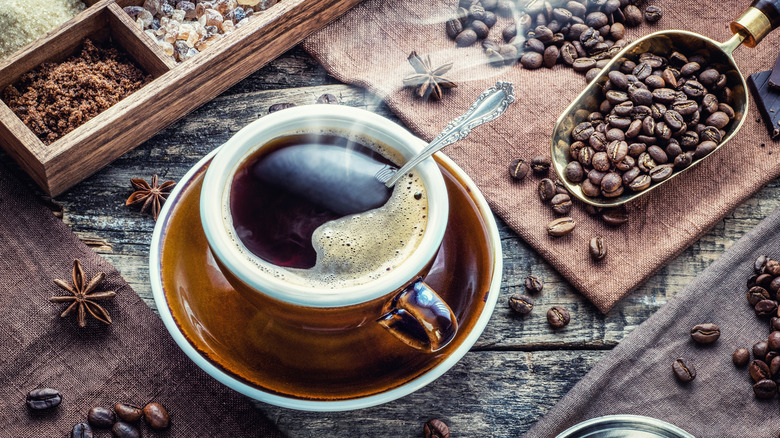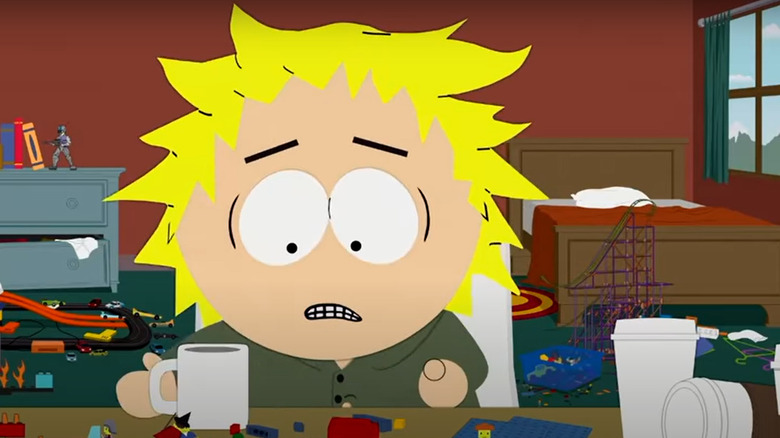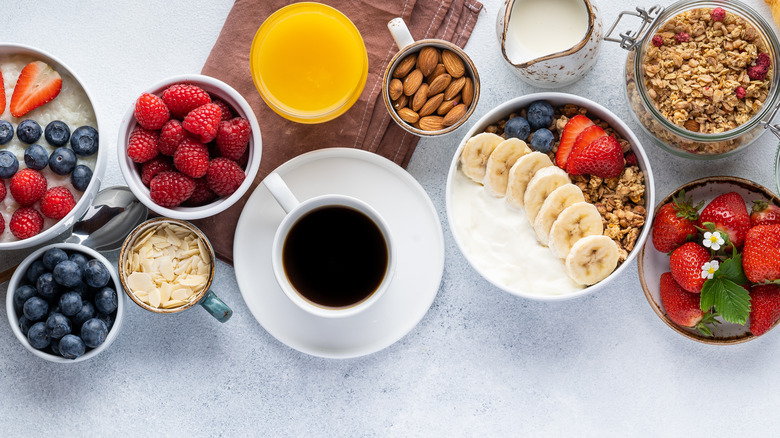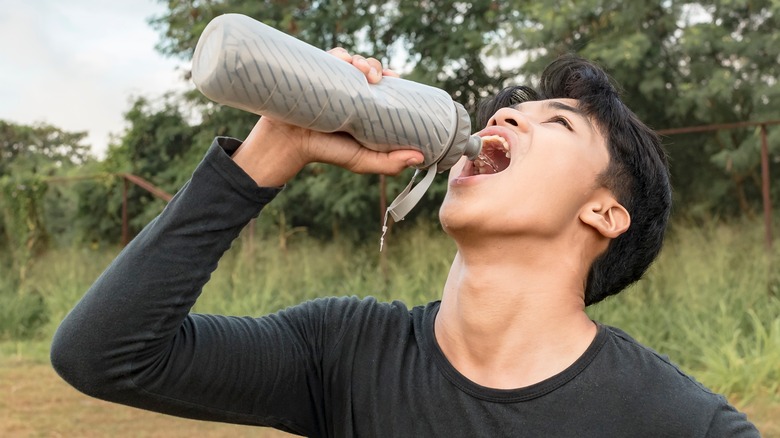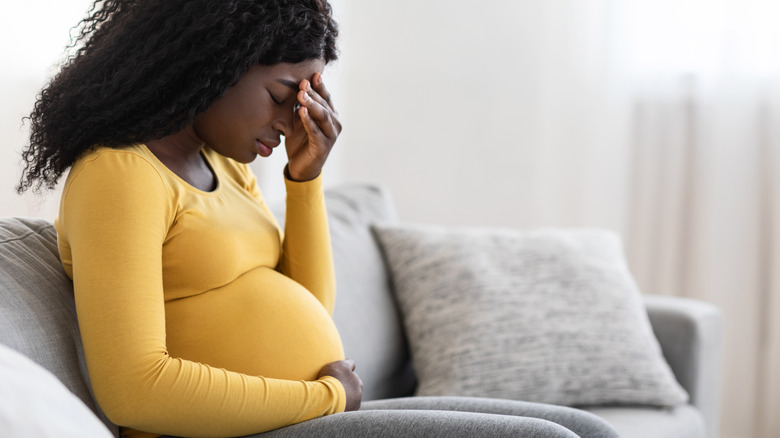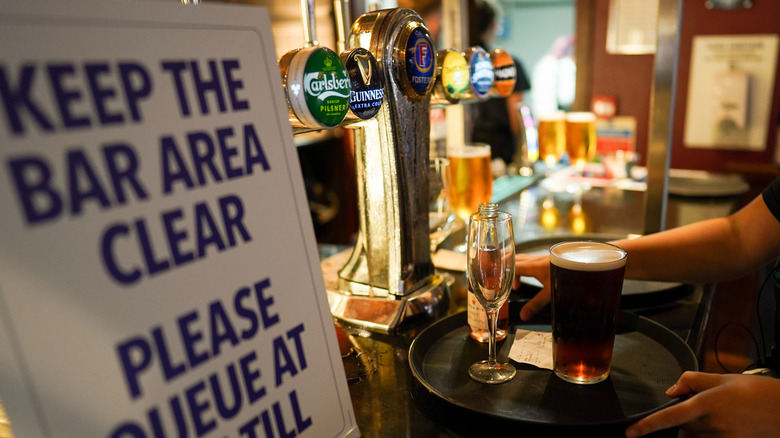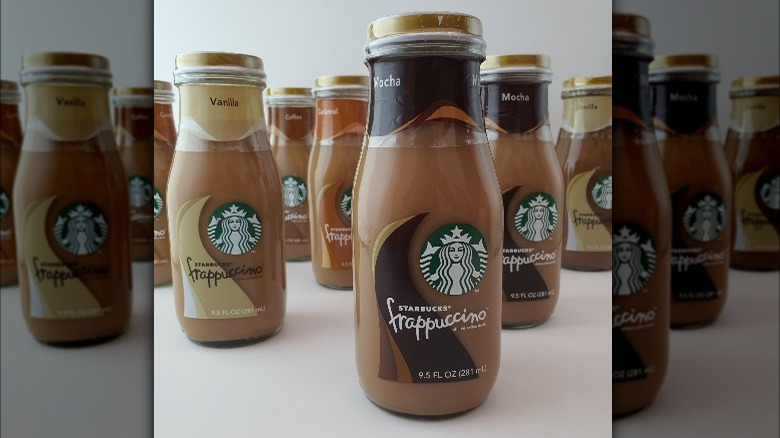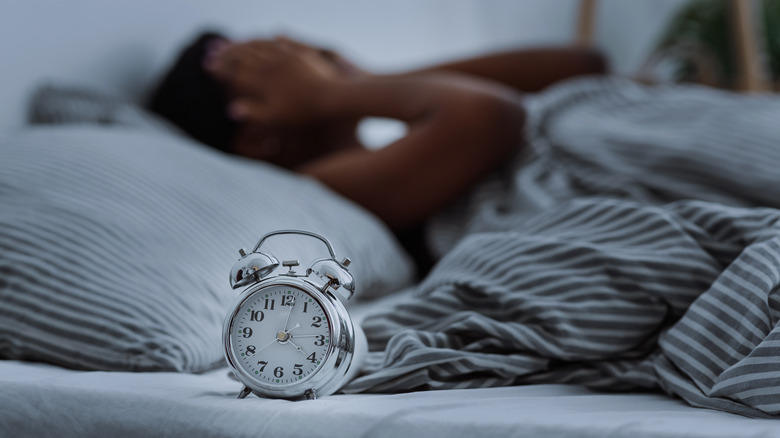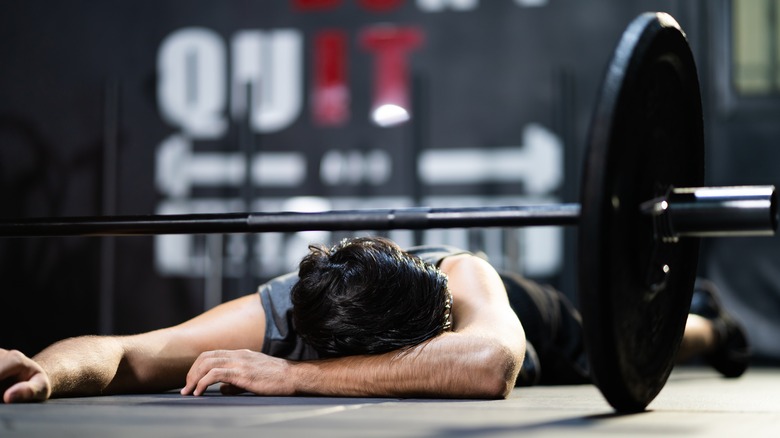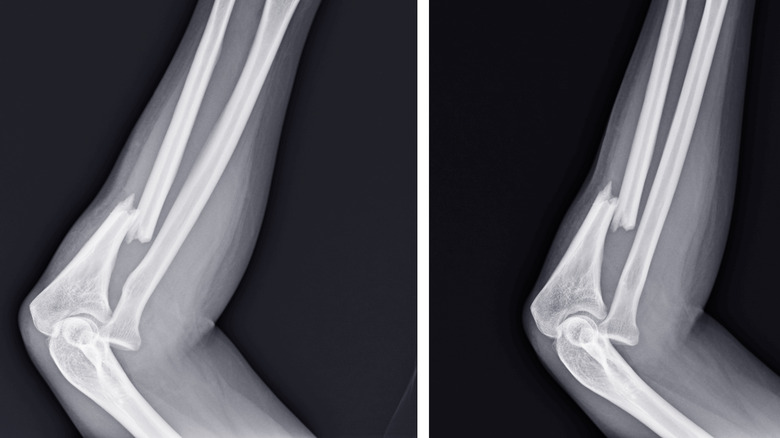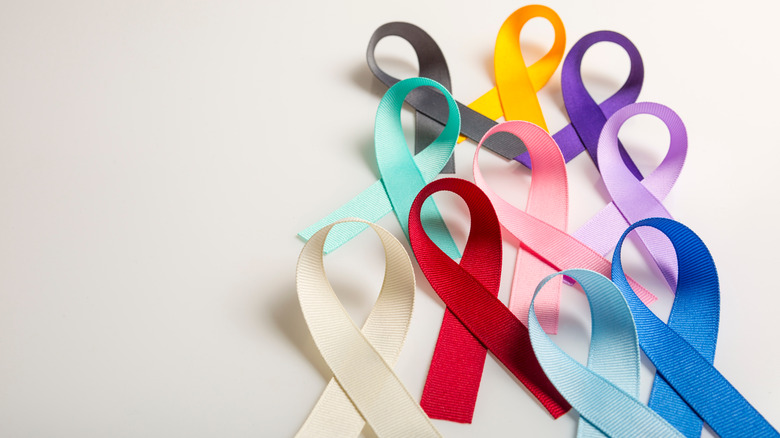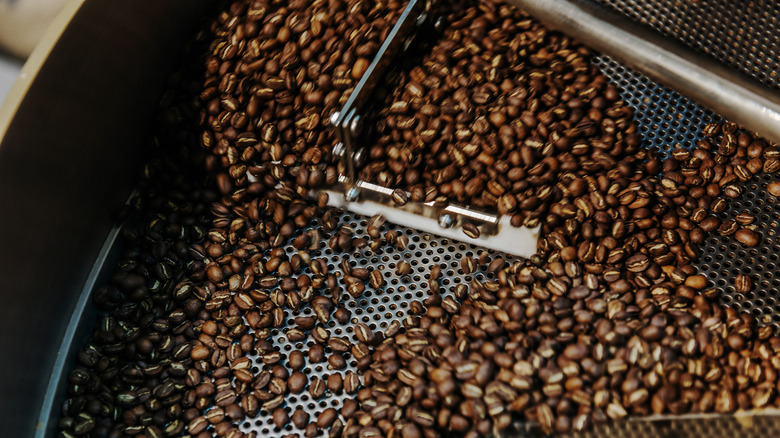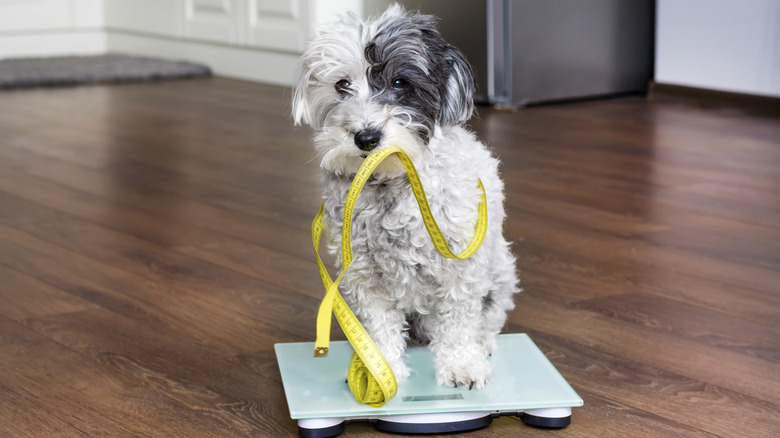Myths About Coffee Most People Believe
America runs on coffee — whether it's Dunkin' or otherwise. Is anything more essential to our morning routine than slugging several cups of freshly-brewed joe? Not likely ... at least not for the 62% of Americans who, as of 2020, drink at least one cup of coffee every day according to the National Coffee Association.
"Don't talk to me, I haven't had my coffee yet," is practically a cliche. The beverage is such a vital part of so many of our day-to-day lives that we're apt to believe coffee can do just about anything — whether good or bad.
And given that it's almost shockingly easy to start believing something you've heard a few times, whether there's proof to back up the claims or not, it's easy to understand how coffee myths have entered the collective subconscious. And once a myth becomes ingrained in our cultural conversations — like, for instance, that coffee can stunt your growth or cause cancer — it's human nature to lose sight of what's real and what's not.
There's no shortage of commonly-held myths about coffee that most people believe; many of which are shrouded in just enough fact to seemingly nullify the larger fiction held within. With that in mind, let's take a look at some of the more popular myths about America's most-consumed beverage, and debunk a number of preconceived notions you may not have even realized needed debunking.
Coffee stunts your growth
We've all been there. It may as well be a right of passage for children throughout the United States, hopelessly begging our parents for just a single cup of coffee, only to be swatted away like a mosquito. "You want to stay that height forever," your mom likely scolded, before launching into a diatribe about how coffee stunts your growth.
Maybe the granddaddy of all coffee-related urban legends, the notion that children and teenagers shouldn't drink coffee because it will stunt their growth isn't rooted in any sort of scientific research (via LiveScience). Frankly, it's hard to even pinpoint where exactly this myth originates, given the lack of firm evidence to support the theory.
Some speculate that the belief in coffee's growth-stunting abilities is rooted in the concurrent myth that coffee can cause osteoporosis, according to Harvard Health (more on that myth in a moment). Yet even that alleged concern isn't based on anything more than presumptive theories, and no study has ever demonstrated a genuine link between a person's height and coffee intake.
Of course, just because coffee won't stunt your child's growth doesn't mean you should let them drink a pot a day. Caffeine can still impact a child's anxiety and blood pressure (via John Hopkins), meaning coffee may not stunt a person's growth, but it may turn your child into Tweek Tweak from "South Park" if you're not careful.
There are no health benefits to drinking coffee
It's true that too much caffeine may elevate a person's anxiety and heart rate, among other concerns (via Verywell Fit). But according to Frank Hu, from Harvard's T.H. Chan School of Public Health, the bottom line is that "coffee is a complex, plant-based beverage, which contains not just caffeine, but also hundreds of bioactive compounds" (via Discover).
Contrary to a segment of past studies that seemed to indicate coffee might be culpable for increasing the risk of health problems, recent research and the total body of evidence available more accurately demonstrates that coffee consumption, in moderation (about three to four cups per day), can actually decrease the risk of developing certain cancers and cardiovascular diseases (via The BMJ). Despite what many of us may believe, when it comes to drinking coffee, Marilyn Cornelis a coffee and caffeine researcher from Northwestern University's Feinberg School of Medicine assures us, "the benefits really do seem to outweigh any adverse effects" (via Discover).
Not unlike the bad rap given to potatoes — with fried or loaded options often obscuring the starchy vegetables' genuine benefits — the myth that coffee has no health benefits may also stem partially from the numerous cream-and-sugar-loaded concoctions available. But just like potatoes can be a wonderful building block for a well-balanced meal plan, coffee, too, can actually be one of the healthiest components of your diet.
Coffee makes you dehydrated
You may be wondering how it's possible that coffee isn't dehydrating, given the fact that the more coffee you drink, the more you have to urinate. Of course, if you drink eight cups of any liquid in a short span, you're likely to find yourself making more frequent trips to the bathroom — whether the beverage is a natural diuretic or not.
While caffeine is, in fact, a natural diuretic, meaning it makes you urinate more frequently, there's no evidence to support the idea that coffee — or any other caffeinated drink, for that matter — is dehydrating (via Mayo Clinic). Not only that, but coffee can actually help keep you hydrated, just like any other fluid (via PLOS). Additionally, while caffeine does act as a diuretic, it doesn't appear to increase one's urination frequency unless they've been deprived of caffeine for a period of at least several weeks.
It may not top water as a means of hydration (which, let's face it, nothing does), but you can rest easy, coffee lovers. Because if you regularly drink the beverage but are worried it'll affect your ability to remain hydrated? You're in luck. You can continue enjoying that aromatically delightful cup of coffee each and every morning, without fear of depriving yourself of precious bodily fluids in the process.
Pregnant women can't drink coffee
Like many other myths about coffee most people believe, there exists some truth in the idea that pregnant women can't — or, perhaps more accurately, shouldn't — drink coffee. Indeed, some evidence does suggest that pregnant women who drink too much caffeine per day raise the risk of potential complications — including smaller birth size (via National Institutes of Health), and behavioral issues (via WebMD).
But there is good news for pregnant women who can't even fathom nine months without coffee. As with so many things in life, the answer doesn't lie in complete and total abstinence; it lies in moderation. Moderate levels of caffeine — about 200 milligrams per day, or two 6-ounce cups of coffee — have been shown to be safe for both mother and child, according to The American College of Obstetricians and Gynecologists.
Moreover, for women who have a substantial caffeine dependence built up before pregnancy, it may be better not to stop drinking coffee, especially cold turkey. After all, it's currently unclear what caffeine "withdrawal ... will do to a pregnancy," says John Foxe, the director of the Del Monte Institute for Neuroscience at the University of Rochester (via WebMD).
Coffee can sober a person up
Millennials may have been duped into believing this common — and dangerous — myth after watching "Independence Day," when coffee transformed Russell Casse (Randy Quaid) from a hopeless drunk into mankind's savior in the span of several hours. But while the stimulating effect of caffeine can masquerade as you conquering your body's blood alcohol content, the cold, hard truth is that you can't negate the impact of alcohol by consuming coffee.
When you've had a few cocktails and are a little buzzed, you'll almost certainly feel more energized and alert if you drink some coffee. Yet feeling less tipsy doesn't actually equate to being less drunk, as coffee has no impact on the body's blood alcohol level (via University of Arkansas). This means that even if you think you've sobered up after a cup of coffee, the disorienting effects of alcohol on the brain and body remain, since it's "still metabolizing ... as if [you] haven't had any caffeine," says Melissa Majumdar of the Academy of Nutrition and Dietetics (via CNN).
In other words, making Starbucks your last stop after a night of bar-hopping won't alleviate any concerns about driving home — and you'll still fail a breathalyzer if you're over the legal limit.
Coffee can cause diabetes
We live in a sugar-saturated society, with seemingly everything we eat and drink loaded with the sweet, white substance. While nutritional guidelines recommend that the average adult eat no more than 12 teaspoons of added sugar per day, the average American consumed a whopping 17 teaspoons each day in 2018. And this high added sugar intake is a significant contributing factor as to why, as of 2021, nearly 10% of the American population (37.7 million total) has diabetes (via CDC).
Given those facts, it makes sense that you'd want to limit foods or drinks known to increase the risk for developing diabetes. Yet, despite what you may have heard, coffee does not belong on the list of items that can lead to diabetes. In fact, research has shown that drinking coffee or caffeinated beverages in moderation (there's that word again) can actually decrease a person's risk for type 2 diabetes (via American Journal of Clinical Nutrition). Additionally, a 2014 study found that individuals who increased their daily coffee intake were significantly less likely to develop diabetes than those who either drank less or the same amount of coffee each day.
Of course, whether or not your personal coffee choice will reduce your risk for diabetes depends on how you take it. So if you love a Frappucino with breakfast, or order your Dunkin' coffee "extra extra," your daily coffee may not help your cause.
Drinking coffee causes insomnia
There are very few things more important to the human body than sleep, which may be why as of 2021 there's a $64 billion industry dedicated to helping us fall — and stay — asleep each night (via Polaris Market Research). It can be a monumental challenge to maintain a consistent sleep schedule, so if you find it nearly impossible to drift into dreamland each evening, it's natural to search for culprits — like coffee or caffeine.
It makes sense, of course, that drinking coffee too soon before bed can disrupt your sleep hygiene, given the stimulating effect of caffeine on the brain and body. But drinking coffee every morning won't cause insomnia in most people, since the half-life of caffeine in the body only lasts between 1.5 to 9.5 hours after ingestion, as noted in the book, "Caffeine for the Sustainment of Mental Task Performance."
While every person is unique, and not all of us react to caffeine the same way, there's little reason to believe coffee, in and of itself, will cause insomnia. So if you have your last cup of coffee by early afternoon, it shouldn't be a factor in your ability to fall asleep later that evening (via Psychology Today).
You shouldn't drink coffee before a workout
Not unlike the myth that coffee is dehydrating, many of us have been led to believe that consuming any coffee or caffeine before a workout is a recipe for poor performance and painful cramps. Yet, when you consider the fact that caffeine increases your focus and energy levels, but does not actually cause dehydration (via Mayo Clinic), it makes sense that drinking coffee before a workout can boost your overall performance — if you time it correctly.
Since caffeine isn't instantly absorbed into the bloodstream, and tends to take around 45 minutes before you fully obtain its energizing benefits (via Healthline), it's best to drink a cup of coffee about an hour before you begin exercising. This ensures you're maximizing the caffeine's performance-enhancing potency, as well as reducing the risk of any digestive issues arising from exercising on a full stomach.
How much coffee you should drink pre-workout varies from person to person. A 2021 study found the ideal amount of caffeine ranges between 160-485 milligrams for a person weighing 180 pounds — the average weight of an American adult in 2020 (via Gallup). This translates to 2-6 milligrams per kilogram body weight. Regardless, your best bet is likely 1-3 cups of coffee before exercise.
Coffee causes osteoporosis
We need our bones to do, well, just about everything. After all, without bones, we'd be little more than dormant sacks of flesh vulnerable to the elements. Yet in our zealous pursuit for bone health, some half-truths have become full-blown realities, like the myth that coffee causes osteoporosis.
Somewhat akin to the notion that apple seeds contain cyanide and can kill you — which, while technically true, requires several thousand seeds to become genuinely poisonous (via Britannica) — there is a minute shred of truth in the fact that caffeine decreases calcium levels (via American Bone Health). It's just that the amount of calcium reduction caused by caffeine is so small that it's barely worth mentioning. And while past research appeared to suggest a correlation between an osteoporosis diagnosis and a person's coffee intake, further studies have shown the culprit for those individuals was a lack of overall calcium intake in the diet (via Harvard Health) — not coffee.
If you're aiming to improve your personal bone health, don't worry about ditching your daily coffee. Instead, consider adding foods rich in calcium and vitamin D, such as yogurt, cheese, or almonds.
Coffee can cause cancer
Everything causes cancer, as the common complaint goes. So why would coffee be any different? Well, because we're here to refute common myths about coffee — and none may be less accurate than the belief that coffee causes cancer.
Largely stemming from a 1981 study that inaccurately showed an association between coffee and pancreatic cancer — which may have resulted from misattributing the negative impact of cigarette smoking to coffee (via Discover) — the myth that coffee causes cancer has been definitively disproven in countless studies. In fact, drinking coffee has been shown to lower the risk for numerous diseases and cancers, including liver, endometrial, and prostate cancers (via American Cancer Society).
While the specifics are unknown, much of the cancer-reducing power found from coffee consumption comes from its high level of antioxidants. Coffee beans are chock full of antioxidants called polyphenols, plant-based nutrients that can help counteract cellular damage in your body, according to WebMD.
Drinking coffee isn't some magic bullet, of course. But it can still be an invaluable tool in reducing your risk for developing a number of cancers, with no carcinogenic qualities to worry about.
Dark roast coffee has more caffeine than lighter roasts
There's no shortage of distinctive differences between light and dark-roasted coffee. The roasting process affects everything about a coffee bean, from the overall flavor profile to the caffeine level, according to Bon Appetit. And while the stronger flavor of dark roast coffee may lead you to believe it's also stronger caffeine-wise, the evidence not only suggests otherwise ... it shows light roast coffee may actually contain more caffeine than its darker-roasted counterpart (via Healthline).
An unfortunate result of the roasting process, a cup of dark roast coffee contains slightly less caffeine than a lighter roast, on average. But since coffee beans enlarge when heated, there's a silver lining for anyone worried about losing their daily jolt from dark roast coffee. The discrepancy between roasts may be little more than a matter of size, and if you measure your coffee by weight? The caffeine difference between dark and light roasts is virtually indistinguible (via Kicking Horse Coffee).
In other words, whether you're a fan of dark or light roasted coffee, don't fret about the caffeine level — you're likely to enjoy the same pick-me-up either way.
Coffee helps you lose weight
By now, it may seem like coffee can do just about anything. After all, we've been pretty clear that drinking coffee can provide numerous health benefits and reduce your risk for certain diseases and cancers (via American Cancer Society). So while it's probably no surprise to learn that coffee consumption can be a part of any weight-loss program ... it can't actually help you lose weight all by itself.
The myth that coffee helps you lose weight could be rooted in the way caffeine acts as an appetite suppressant. This theoretically reduces how much you eat, and causes you to be more active — which, in turn, helps you lose weight. Additionally, research has shown that coffee can, in fact, help your body burn fat and increase your metabolism (via Healthline). But those appealing effects appear to taper off over time, before diminishing entirely once a tolerance to caffeine is built up.
So while you may wish that your morning cuppa joe could function as your magic weight loss elixir, by itself, it won't be enough. That said, if you avoid those high-fat, high-sugar coffees, and maintain a healthy, well-balanced diet, you'll be able to lose weight with coffee — not because of it.
